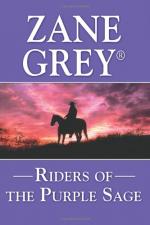Pinyon pines clustered in little clumps along the level floor of the pass. Twilight had gathered under the walls. Venters rode into the trail and up the canyon. Gradually the trees and caves and objects low down turned black, and this blackness moved up the walls till night enfolded the pass, while day still lingered above. The sky darkened; and stars began to show, at first pale and then bright. Sharp notches of the rim-wall, biting like teeth into the blue, were landmarks by which Venters knew where his camping site lay. He had to feel his way through a thicket of slender oaks to a spring where he watered Wrangle and drank himself. Here he unsaddled and turned Wrangle loose, having no fear that the horse would leave the thick, cool grass adjacent to the spring. Next he satisfied his own hunger, fed Ring and Whitie and, with them curled beside him, composed himself to await sleep.
There had been a time when night in the high altitude of these Utah uplands had been satisfying to Venters. But that was before the oppression of enemies had made the change in his mind. As a rider guarding the herd he had never thought of the night’s wildness and loneliness; as an outcast, now when the full silence set in, and the deep darkness, and trains of radiant stars shone cold and calm, he lay with an ache in his heart. For a year he had lived as a black fox, driven from his kind. He longed for the sound of a voice, the touch of a hand. In the daytime there was riding from place to place, and the gun practice to which something drove him, and other tasks that at least necessitated action, at night, before he won sleep, there was strife in his soul. He yearned to leave the endless sage slopes, the wilderness of canyons, and it was in the lonely night that this yearning grew unbearable. It was then that he reached forth to feel Ring or Whitie, immeasurably grateful for the love and companionship of two dogs.
On this night the same old loneliness beset Venters, the old habit of sad thought and burning unquiet had its way. But from it evolved a conviction that his useless life had undergone a subtle change. He had sensed it first when Wrangle swung him up to the high saddle, he knew it now when he lay in the gateway of Deception Pass. He had no thrill of adventure, rather a gloomy perception of great hazard, perhaps death. He meant to find Oldring’s retreat. The rustlers had fast horses, but none that could catch Wrangle. Venters knew no rustler could creep upon him at night when Ring and Whitie guarded his hiding-place. For the rest, he had eyes and ears, and a long rifle and an unerring aim, which he meant to use. Strangely his foreshadowing of change did not hold a thought of the killing of Tull. It related only to what was to happen to him in Deception Pass; and he could no more lift the veil of that mystery than tell where the trails led to in that unexplored canyon. Moreover, he did not care. And at length, tired out by stress of thought, he fell asleep.




